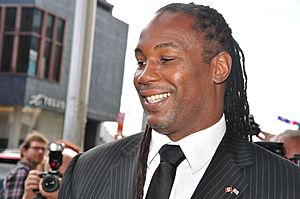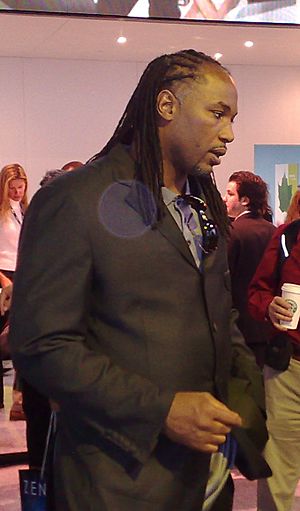Lennox Lewis facts for kids
Quick facts for kids
Lennox Lewis
|
|||||||||||||||||||||||||||||||||||||||||||||||||||||||||||||||||||||||||||
|---|---|---|---|---|---|---|---|---|---|---|---|---|---|---|---|---|---|---|---|---|---|---|---|---|---|---|---|---|---|---|---|---|---|---|---|---|---|---|---|---|---|---|---|---|---|---|---|---|---|---|---|---|---|---|---|---|---|---|---|---|---|---|---|---|---|---|---|---|---|---|---|---|---|---|---|

Lewis in 2010
|
|||||||||||||||||||||||||||||||||||||||||||||||||||||||||||||||||||||||||||
| Born |
Lennox Claudius Lewis
2 September 1965 London, England
|
||||||||||||||||||||||||||||||||||||||||||||||||||||||||||||||||||||||||||
| Citizenship |
|
||||||||||||||||||||||||||||||||||||||||||||||||||||||||||||||||||||||||||
| Education | Cameron Heights Collegiate Institute | ||||||||||||||||||||||||||||||||||||||||||||||||||||||||||||||||||||||||||
|
|||||||||||||||||||||||||||||||||||||||||||||||||||||||||||||||||||||||||||
Lennox Claudius Lewis (born September 2, 1965) is a boxing commentator and a famous former professional boxer. He competed in the heavyweight division, for the largest boxers, from 1989 to 2003. Many people think he is one of the greatest heavyweight boxers of all time.
Lewis was a three-time world champion and the last heavyweight to be the undisputed champion for nearly 25 years. This means he held all the major championship belts at once. He has both British and Canadian citizenship. Before turning professional, he represented Canada as an amateur at the 1988 Summer Olympics, where he won a gold medal.
As a professional, Lewis won his first 21 fights. He became the World Boxing Council (WBC) heavyweight champion in 1992. He later lost the title in a surprise defeat but won it back in a rematch in 1997. In 1999, he defeated Evander Holyfield to become the undisputed champion.
Lewis had famous victories against other great boxers, including Mike Tyson in 2002. He retired in 2004 after defeating Vitali Klitschko. He finished his career with a record of 41 wins, 2 losses, and 1 draw.
Contents
Early Life
Lennox Lewis was born on September 2, 1965, in London, England. His parents were from Jamaica. When he was born, he weighed 10 pounds and 10 ounces (4.8 kg). The doctor who delivered him gave him the name Lennox.
When Lewis was 12 years old, he moved to Kitchener, Ontario, in Canada with his mother. In high school, he was a talented athlete and played Canadian football, soccer, and basketball. He even helped his school's basketball team win a championship.
Amateur Boxing Career
Lewis decided that boxing was his favorite sport. He started boxing around 1978 and quickly became a top amateur boxer. In 1983, he won the Junior World Championships.
At age 18, he represented Canada at the 1984 Summer Olympics in Los Angeles. He reached the quarter-finals but lost to American boxer Tyrell Biggs, who went on to win the gold medal. Lewis decided to remain an amateur for four more years to try for a gold medal again.
In 1988, Lewis traveled to Seoul, South Korea, for the 1988 Summer Olympics. This time, he achieved his goal. In the final match, he defeated American boxer Riddick Bowe to win the super-heavyweight gold medal. He was the first Canadian in 56 years to win a gold medal in boxing.
Professional Career
Becoming a Champion
After winning Olympic gold, Lewis became a professional boxer and moved back to England. He won his first 21 fights, many by knockout. He won the European, British, and Commonwealth heavyweight titles.
In 1992, he defeated Donovan Ruddock to become the number one contender for the WBC heavyweight title. The champion at the time, Riddick Bowe, refused to fight him. Bowe even threw his championship belt in a trash can at a press conference. Because of this, the WBC declared Lewis the new champion. He was the first British world heavyweight champion in the 20th century.
Lewis defended his title three times, including a famous fight against fellow British boxer Frank Bruno.
Losing and Regaining the Title
In 1994, Lewis lost his title in a shocking upset to Oliver McCall. Lewis was knocked down and the referee stopped the fight. After this loss, Lewis hired a new trainer, the famous Emanuel Steward. Steward helped Lewis improve his boxing style, especially his powerful jab.
In 1997, Lewis and McCall had a rematch for the vacant WBC title. The fight was very strange. After three rounds, McCall refused to fight and started crying in the ring. The referee stopped the fight, and Lewis was declared the winner and the new champion.
Becoming the Undisputed Champion
On March 13, 1999, Lewis fought Evander Holyfield to unify the heavyweight titles. Most people thought Lewis clearly won the fight, but the judges declared it a draw. This was very controversial.
A rematch was held eight months later. This time, Lewis won by a unanimous decision. He became the undisputed heavyweight champion, holding the WBA, WBC, and IBF titles.
Famous Fights and Retirement
In 2001, Lewis suffered another surprise loss when he was knocked out by Hasim Rahman. However, Lewis had a rematch clause in his contract. Later that year, he knocked out Rahman in the fourth round to win back his titles.
On June 8, 2002, Lewis fought Mike Tyson in one of the most anticipated fights in boxing history. Lewis dominated the fight and knocked Tyson out in the eighth round.
His final fight was in 2003 against Vitali Klitschko. The fight was stopped after the sixth round because Klitschko had a severe cut over his eye. Lewis was awarded the victory by technical knockout (TKO). Shortly after this fight, in February 2004, Lewis announced his retirement from boxing.
Fighting Style
Lennox Lewis was a tall boxer with a very long reach of 84 inches (213 cm). He was known for his powerful jab, which he used to control the distance and set up his other punches. His most famous punch was his strong straight right hand.
Under his trainer Emanuel Steward, he became a more complete boxer. He was known for being patient and smart in the ring. He was physically strong and could fight aggressively when needed.
Legacy
Lennox Lewis is considered one of the greatest heavyweight boxers in history. He is one of only a few boxers to win an Olympic gold medal and then become a professional world champion.
He is also one of the few heavyweight champions to retire with a victory over every opponent he ever faced. He avenged his only two losses in rematches. Along with Rocky Marciano and Gene Tunney, he is one of the few heavyweights to retire as world champion.
Lewis was inducted into the International Boxing Hall of Fame in 2009. His success proved he was the best heavyweight of his time.
Life Outside of Boxing
After retiring, Lewis has worked as a boxing analyst for television. He has also appeared in movies and TV shows. He had a role in the film Ocean's Eleven and was a contestant on the TV show The Celebrity Apprentice.
Lewis is a big fan of chess and has funded a chess program for children. He also supports his hometown football club, West Ham United.
He is married to Violet Chang and they have four children. He holds both British and Canadian citizenship.
See also
 In Spanish: Lennox Lewis para niños
In Spanish: Lennox Lewis para niños
 | James B. Knighten |
 | Azellia White |
 | Willa Brown |


